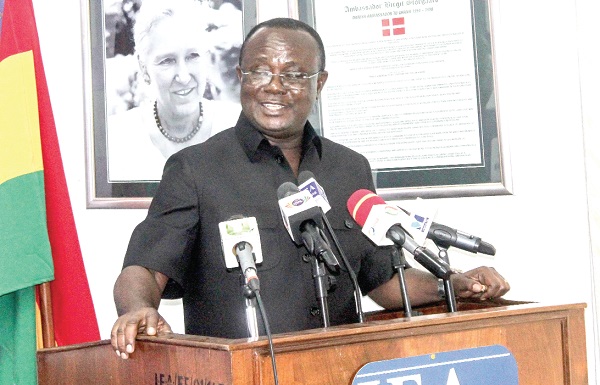
Amending 1992 Constitution not enough; Let’s focus on new mindset, national values — Osei-Owusu
The First Deputy Speaker of Parliament, Joseph Osei-Owusu, says changing aspects of the 1992 Constitution will not be sufficient to address democratic challenges or achieve the good governance expected.
He opines that the emphasis should rather be on changing the orientation of Ghanaians and building new national values.
According to him, the country should focus on developing a new mindset that makes people take responsibility, be accountable, honest and law abiding”.
“The fine prints of the Constitution may have defects; we can change them, but that alone is not sufficient. I think we should put more emphasis on changing our orientation, building new national values and selling them to children as they grow up,” he said.
Advertisement
Mr Osei-Owusu said this at the Institute of Economic Affairs’ Constitutional Review Seminar on Tuesday in Accra.
It was on the theme “Reviewing Ghana’s 1992 Constitution: Viewpoints from Parliament.”
Authority
Mr Osei-Owusu, who is also the Member of Parliament (MP) for Bekwai, asked whether there would be any difference amending the Constitution if Ghanaians continued in wrong behaviours.
“Would anything different happen if we just change the wording; the letter of the Constitution? No!” he stated.
Local governance
Citing an example under the Constitution in the Local Government Act, he said economic development was decentralised and the district assemblies were supposed to be in charge, “but even the common fund that the Constitution says should be distributed …we don’t do it”.
The MP said that to date, about 90 per cent of the local authorities could not raise revenue, to the extent that now “we have budgeted to bring the collection of revenue at the district assembly to the centre, and to be managed by the Ghana Revenue Authority.”
“What difference would it make if we change the wording?” he enquired.
Again, he said, under the Ghana Investment Council Promotion Act, foreigners were not supposed to engage in retail trade. But going to the Makola Market, the situation was different.
“So I think that an amendment of the Constitution only and nothing more may not achieve anything new,” he emphasised, adding: “We may not be able to meet the aspirations and we may not be able to create the public value for which we are elected officials.”
Mr Osei-Owusu suggested that in addition to whatever amendment, “we should focus on developing a new mindset that makes people take responsibility, be accountable, honest and law-abiding.”
Over the years, he said, Ghanaians had abandoned anything called national value, with the consistent and persistent deterioration of integrity in the last 61 years.
“The problem we have in this country is dishonesty; it is widespread. It’s a pity that we tend to focus on public office holders, elected officials,” he said, adding that some were also irresponsible when it came to handling public property.
Mr Osei-Owusu also cited the non-payment of taxes by a vast majority of people for the provision of goods and services.
Limit
The MP for Abuakwa South, Samuel Atta Akyea, said there should be an upper limit to the number of people who go to the Supreme Court, adding that for “those of you who are interested in looking at the constitution, you would see that, as it stands now, it is too open-ended for comfort, and I believe we should do something about it.”
“If there is one particular amendment that I am very much interest in, I believe that is it,” he said.
The MP for Akwapim South, Osei Bonsu Amoah, said the day for elections was one thing that needed to be agreed on by Ghanaians.
“Should we just depend on any day on December 7, one month before Parliament is dissolved?” he queried, wondering whether Ghanaians could agree on that.
Independence
The Rector of the Ghana Institute of Social Democracy and the former Director of Research of the National Democratic Congress (NDC), Dr William Ahadzi, said the appointment of ministers from Parliament was worth looking at, as that was linked to the independence of Parliament.
The Chairman of the Political Affairs Committee of the Convention People’s Party (CPP), Kwame Jantuah, asked: “If we claim to have strict separation of powers, why is it the responsibility of the president to appoint the chief justice, in consultation with the Council of State, and approval by Parliament?
The Senior Adviser of the Speaker of Parliament and former MP for Ho Central, Kofi Attoh, agreed with the position taken by Mr Osei-Owusu, saying that “it is not so much of what is amended that is the matter, but those of us implementing it.”
The immediate past Speaker of Parliament, Prof. Aaron Mike Oquaye, who chaired the event, said all the views of the speakers would be incorporated into the institute’s final deliberations.
